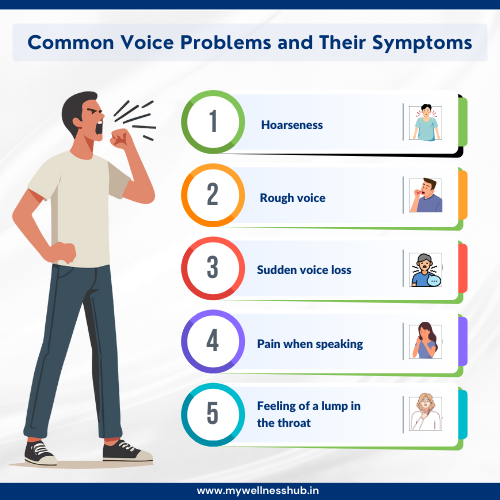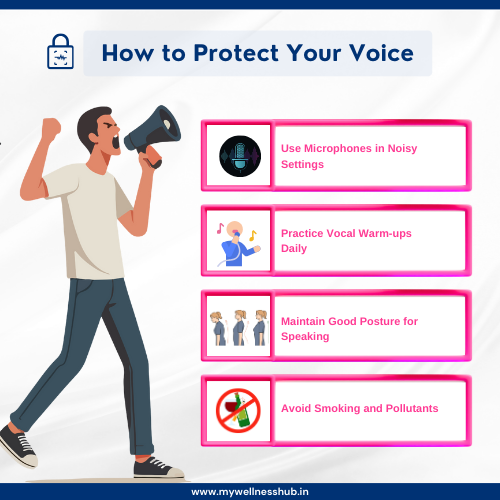10 Effective Ways to Avoid Voice Issues in Adults
By Rajini D
Last Updated: May 6, 2024
Ever stopped to think about how much we rely on our voices every day? From chatting with friends and family to participating in meetings at work, our voice is our primary tool for communication. Yet, it’s easy to take this crucial ability for granted—until we face voice issues. Voice problems in adults are surprisingly common, impacting millions each year and affecting everything from professional performance to personal interactions.
Many of us may not realize the strain our vocal cords undergo daily. Whether you’re a teacher leading a class, a salesperson making pitches, or simply catching up over long calls, your voice needs care and attention to stay healthy. Thankfully, maintaining vocal health isn’t just possible; it’s quite manageable with the right practices.
Read Also: 6 Reasons an Adult Would Need A Speech Therapist
Understanding Voice Problems

Voice problems, or voice disorders, occur when there are difficulties with pitch, volume, tone, and other qualities of one’s voice. In adults, these issues can manifest in various ways—perhaps your voice becomes hoarse, or you find it hard to speak after a long day of talking. For some, their voice might sound breathy or strained, or there might even be occasional loss of voice, known as laryngitis.
What causes these voice issues? Primarily, they stem from three main areas:
- Overuse and Strain: Much like overdoing any physical activity can lead to muscle soreness, overusing your vocal cords can lead to strain and discomfort. This is common among professionals who rely heavily on their voice, such as teachers, singers, call center workers, and public speakers.
- Environmental Factors: Your surrounding environment plays a significant role in vocal health. Exposure to excessive noise, needing to shout regularly, air pollution, or even dry air can irritate the vocal folds. Indoor environments with poor air quality or allergens can also lead to voice problems.
- Health Conditions: Various health issues can affect your voice. These include respiratory infections, acid reflux, thyroid conditions, and neurological disorders. Even common colds or sinus infections can temporarily impact your vocal cords.
By recognizing these common causes, you can start to take proactive steps to protect your voice. Remember, your voice is a key part of your identity and your primary tool for communication. It’s essential to take care of it to maintain your quality of life and professional effectiveness.
Daily Habits for Healthy Vocal Cords
Taking care of your voice is not just about avoiding loud environments or resting your voice after a long day of speaking. It also involves incorporating daily habits that foster vocal health. Here are some key practices you can adopt to keep your vocal cords in top shape:
1. Stay Hydrated
Hydration is crucial for maintaining the lubrication of your vocal cords. Dry vocal cords can become irritated and are more prone to damage. Aim to drink at least 8 cups of water a day. Here’s how you can seamlessly integrate more water into your daily routine:
- Start your day with a glass of water every morning.
- Keep a water bottle handy at all times, especially if you have a job that requires a lot of talking.
- If plain water isn’t appealing, try adding a slice of lemon or cucumber for a refreshing twist.
2. Moderate Voice Usage
Just like any part of your body, your voice can get tired if you overuse it. To prevent strain:
- Take vocal naps—short periods of silence—throughout the day to give your voice a break.
- Use a conversational volume whenever possible, avoiding the need to shout.
- Be mindful during phone calls or virtual meetings, where you might unconsciously raise your voice.
3. Warm-Up Your Voice
Think of vocal warm-ups as a mini workout for your vocal cords. This is especially important before extensive speaking engagements or performances. Simple exercises include:
- Humming gently up and down your vocal range.
- Practicing vowel sounds (a-e-i-o-u) in a soft, moderate tone.
- Light lip trills can help relax the voice.
4. Maintain a Healthy Lifestyle
Overall, physical health greatly impacts vocal health. Ensure you:
- Eat a balanced diet rich in fruits, vegetables, and lean proteins to support overall health.
- Get enough sleep, as fatigue can strain your vocal cords just as much as physical strain.
5. Avoid Harmful Habits
Certain habits can be detrimental to your vocal health:
- Smoking can inflame and irritate the vocal cords, so it’s best to avoid it altogether.
- Avoid shouting or speaking loudly over noise, which strains your voice.
Daily Habits for Healthy Vocal Cords
| Habit | Description | Benefits | Practical Tips |
|---|---|---|---|
| Stay Hydrated | Drink sufficient water throughout the day to keep vocal cords hydrated. | Keeps vocal cords lubricated and reduces risk of irritation. | Carry a water bottle, and aim for 8 glasses per day. |
| Moderate Voice Usage | Use your voice carefully to avoid strain. | Prevents vocal fatigue and damage. | Schedule quiet times, and use a conversational volume. |
| Warm-Up Your Voice | Perform vocal warm-ups before extensive use. | Prepares vocal cords for use, reducing the risk of injury. | Humming, lip trills, and gentle vocal exercises. |
| Maintain a Healthy Diet | Eat a balanced diet that supports overall health. | It supports immune function and reduces inflammation. | Include anti-inflammatory foods like ginger and honey. |
| Ensure Adequate Rest | Get enough sleep and rest your voice as needed. | It Allows vocal cords to recover and prevents overuse. | Aim for 7-9 hours of sleep, and take vocal naps. |
| Avoid Harmful Substances | Stay away from cigarettes and limit alcohol intake. | Reduces the risk of vocal cord damage and irritation. | Quit smoking, and drink alcohol in moderation. |
Protective Strategies Against Voice Damage

Keeping your vocal cords healthy isn’t just about the things you can add to your daily routine; it’s also about protecting yourself from potential damage. Here are several strategies to help you maintain your vocal health effectively:
Read more about Voice Care Secrets: How to Implement Effective Vocal Hygiene
6. Use Assistive Tools When Necessary
In environments where you must raise your voice to be heard, such as during presentations or in noisy settings, using assistive devices can be a game-changer. Consider using a microphone or portable amplifier. This simple tool can prevent strain by amplifying your voice without extra effort from your vocal cords, allowing you to communicate effectively without risk.
7. Practice Proper Vocal Techniques
One of the key elements of good vocal health is proper technique. Speak from your diaphragm rather than just your throat, which not only gives your voice more power but also reduces strain. Imagine you’re filling your lower belly with air when you breathe in, and use this air to power your speech as you talk. This technique supports sustained and healthier voice use.
8. Adopt a Good Posture
Your posture plays a critical role in how well you can project your voice. Standing or sitting straight, with your shoulders back and your head up, allows your respiratory system to work more efficiently. Proper alignment reduces pressure on your vocal cords and can enhance the clarity and quality of your voice. A good posture is also more engaging and professional, making it a vital habit for anyone who uses their voice extensively.
9. Minimize Environmental Hazards
Be mindful of environmental factors that can harm your vocal cords. Pollutants, allergens, and dry air can all lead to irritation and inflammation. Here are a few ways to protect yourself:
- Use a humidifier in dry environments to keep your airways moist.
- Wear a mask in dusty or polluted areas to filter out harmful particles.
- Avoid smoking areas, as smoke can be extremely harsh on your vocal cords.
When to Seek Professional Help
While many voice issues can be managed with good practices at home, it’s important to know when to seek professional help. Recognizing the signs that indicate more serious conditions and knowing when to consult with specialists can prevent long-term damage and ensure proper care.
10. Recognize Signs of Vocal Trouble
Persistent voice problems are not something to ignore. Here are some key signs that it might be time to see a professional:
- Hoarseness or a rough voice that lasts for more than two weeks.
- Sudden voice loss or significant changes in voice quality that do not improve with rest.
- Pain, discomfort, or a sensation of a lump in your throat when using your voice.
- Difficulty swallowing or a persistent sore throat.
- Frequent need to clear your throat or a persistent cough.
If you experience any of these symptoms, it could indicate an underlying issue that requires more than just home care.
Consult With Specialists
Visiting an ENT (ear, nose, and throat) specialist or a speech therapist can be crucial if you have ongoing voice issues. These professionals can evaluate your voice and throat with specialized tools and tests to accurately diagnose the problem. Early diagnosis can mean simpler treatments and a quicker return to a healthy voice. Consulting with a speech therapist is also beneficial, as they can offer exercises and techniques tailored to your specific needs, helping you use your voice more effectively and safely.
When to Seek Professional Help
| Symptom | Possible Causes | Recommended Action |
|---|---|---|
| Hoarseness lasting > 2 weeks | Overuse, infection | Consult an ENT (Ear, Nose, and Throat doctor) |
| Persistent throat pain | Acid reflux, infection, throat irritation | See a doctor for a full evaluation |
| Voice loss | Vocal cord damage, severe laryngitis | Seek immediate medical help |
| Frequent coughing | Allergies, infection, vocal strain | Visit a healthcare provider |
| Change in voice pitch | Vocal cord swelling, hormonal changes | Consult an ENT specialist |
| Difficulty swallowing | Tumor, neurological disorders | See a doctor immediately |
| Unusual vocal fatigue | Overuse, improper vocal technique | Schedule a visit with a speech therapist |
| Chronic throat clearing | Acid reflux, chronic sinusitis | Consult a gastroenterologist or ENT |
Consider Professional Voice Care
For more serious conditions, professional voice care might be necessary. Treatments can vary widely, depending on the diagnosis:
- Vocal therapy: Often, the first line of treatment involves tailored exercises to strengthen your vocal cords and improve voice habits.
- Medication: Can address underlying issues like inflammation, infections, or acid reflux that affect voice quality.
- Surgery: In cases where vocal nodules, polyps, or other structural issues are present, surgical intervention may be required to restore normal voice function.
Remember, taking action at the right time can be crucial in preventing long-term damage to your voice. Don’t hesitate to reach out to a healthcare provider if you have concerns about your vocal health. For more information on when to seek help and what to expect, visit our Professional Voice Care section at Wellness Hub.
Conclusion
Taking care of your voice is crucial because it helps you in everyday activities like talking at work or chatting with friends. We’ve talked about several important ways to keep your voice healthy, such as drinking enough water, not using your voice too much, warming up your vocal cords, living a healthy lifestyle, and staying away from bad air and loud noises. By following these simple tips, you can keep your voice strong and clear.
At Wellness Hub, we want to help you stay healthy in every way. We have lots of good advice on keeping your voice and your whole body in good shape. Check out our website for helpful tips and ideas. Remember, looking after your voice also helps improve your overall well-being, letting you enjoy your daily life without worry.
Frequently Asked Questions:
1. What are common signs of voice issues in adults?
Common signs include persistent hoarseness, voice fatigue, pain when speaking, and sudden changes in voice quality. If you experience any of these symptoms for more than two weeks, it may be time to consult a specialist.
2. How can I prevent voice problems?
To prevent voice problems, stay hydrated, use your voice moderately without shouting, warm up your voice before heavy use, and maintain overall good health. Also, avoid environments that strain your voice, like areas with lots of dust or smoke.
3. Why is hydration important for vocal health?
Hydration helps keep your vocal cords lubricated. Dry vocal cords can become irritated and are more prone to damage. Drinking plenty of water throughout the day is essential for maintaining vocal health.
4. What are some simple vocal warm-ups I can do?
Simple vocal warm-ups include humming, practicing gentle vowel sounds (a-e-i-o-u), and doing lip trills. These exercises help prepare your vocal cords for extended use and can prevent strain.
5. When should I see a doctor for voice issues?
You should see a doctor if you have persistent voice issues such as hoarseness, throat pain, or any change in your voice that lasts more than two weeks. Early diagnosis and treatment are key to addressing voice problems effectively.
6. How does smoking affect vocal health?
Smoking irritates and inflames the vocal cords, which can lead to chronic issues like hoarseness and an increased risk of vocal cord lesions. Quitting smoking is highly recommended to protect your vocal health.
7. Can diet affect my vocal health?
Yes, your diet can impact your vocal health. Foods that cause acid reflux, such as spicy or highly acidic foods, can damage your vocal cords over time. Eating a balanced diet and avoiding meals that trigger reflux can help protect your voice.
8. What lifestyle changes can help improve vocal health?
In addition to staying hydrated and practicing proper vocal techniques, maintaining a healthy lifestyle through regular exercise and sufficient sleep can significantly improve vocal health. Reducing stress and avoiding vocal strain during illness is also important.
9. How can I protect my voice from damage in noisy environments?
In noisy environments, it’s crucial to use assistive devices like microphones or amplifiers to avoid shouting. If you frequently need to speak in loud settings, consider investing in personal amplification equipment to protect your vocal cords from strain.
10. Are there professional treatments for serious voice issues?
Yes, for more severe voice problems, treatments can include vocal therapy from a speech-language pathologist, medications to treat underlying conditions, and, in some cases, surgery to correct vocal cord damage. Consult with an ENT specialist or a speech therapist to determine the best treatment plan for your specific condition.
About the Author:
Rajini Darugupally
M.Sc., Speech-Language Pathologist (9+ years of experience)
Rajini is a passionate and dedicated Speech-Language Pathologist with over 9+ years of experience, specializing in both developmental speech and language disorders in children and rehabilitation in adults. Driven by a desire to empower each individual to find their voice, Rajini brings a wealth of experience and a warm, genuine approach to therapy.
Currently, at Wellness Hub, she thrives in a team environment that values innovation, compassion, and achieving results for their clients.
Connect with Rajini to learn more about how she can help you or your loved one find their voice.
Book your Free Consultation Today
Parent/Caregiver Info:
Client’s Details:
* Error Message









